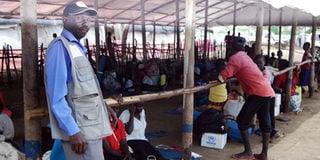Locals disguise as refugees to access relief items

Dire situation. Palabek Settlement Camp commandant David Wangwe (left) with some of the South Sudan refugees at the camp reception centre last Friday. PHOTO BY CISSY MAKUMBI
What you need to know:
Not any better. The local residents claim they are also needy and therefore need assistance.
LAMWO.
Residents of Lamwo District are now disguising as South Sudan refugees in order to access some of the relief items given to the latter, district officials say.
Lamwo District currently hosts a total of 5,000 South Sudanese refugees in Palabek Ogili, Palabek Kal and Palabek Gem settlement camps who fled their homes following renewed fights between government soldiers and several militia groups in South Sudan early this month.
The government, through the Office of the Prime Minister and humanitarian aid agency United Nation High Commissioner for Refugees, have allocated each refugee household a 30x30m piece of land for setting up a shelter and another 30x30m for small farming. Other items given to the refugees include saucepans, jerrycans, tarpaulin, cups, plates, cooking oil, solar lights, blanket, mosquito nets and food.
The Palabek Settlement Camp commandant, Mr David Wangwe, told Daily Monitor in an interview recently that the items given to the refugees have tempted the locals to disguise as refugees in order to benefit from the same.
“Some [locals disguising as refuges] have been spotted out and advised to leave the settlement camps so that a chance is given to the very needy,” Mr Wangwe said.
However, Ms Agnes Lamunu, one of the locals in the area, told Daily monitor that those who disguise as refugees are looking for food since most of them had poor harvests due to the prolonged dry spell that hit the district. She added that they are also needy since the instability at the neighbourhood also affected them.
The Lamwo Resident District Commissioner, Mr Jonathan Rutabingwa, asked the locals to dissuade themselves from being materialistic, adding that as host communities, the government is working out on the modalities of helping them out.
“The locals should know that it’s illegal and criminal for them to call themselves refugees yet they are not. We have now tightened screening at the centre to avoid locals from taking away what is meant for the refugees,” he said.



